Delhi | Kolkata
Bangalore | Chennai
Liver Transplant in India
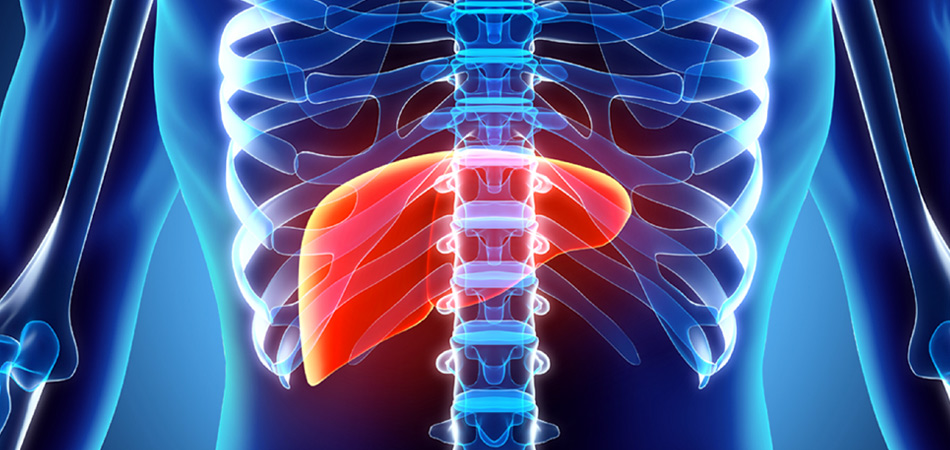
Liver Anatomy and Function
The liver is a vital organ, meaning that one cannot live without it. The liver serves many important functions including metabolism of drugs and toxins, removal of degraded products of normal body metabolism (for example removal of ammonia and bilirubin from the blood), and synthesis of many vital proteins and enzymes (such as factors necessary for blood clotting).
Blood enters the liver from two channels, the hepatic artery and the portal vein, bringing nutrients and oxygen to liver cells, also known as hepatocytes, and bile ducts. Blood leaves the liver via the hepatic veins which drain into the inferior vena cava which instantly enters the heart. The liver makes bile, a liquid that helps dissolve fat and remove metabolic waste and toxins via the intestine. Each hepatocyte creates bile and excretes it into microscopic channels that link to form bile ducts. Like streams joining to form a river, the bile ducts join to form a single "hepatic duct" that brings bile into the intestine.
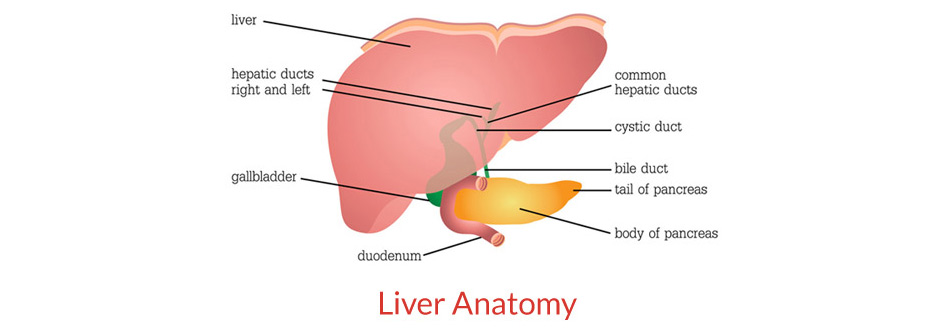
Basically, liver is your largest internal organ and performs numerous critical functions, including:
> Processing nutrients, medications and hormones
> Producing bile, which helps the body absorb fats, cholesterol and fat-soluble vitamins
> Making proteins that help in blood clotting
> Eliminating bacteria and toxins from the blood
> Averting infection and regulating immune responses
Reasons for a Liver Transplant
Liver failure occurs when a disease or injury makes it impossible for the liver to function adequately to keep the body alive. The liver has several important functions and when it is not able to carry them out, a person will become very ill; in severe cases, they will die from liver failure.
Because liver transplants are costly and carry major risks, doctors approve them only as a last resort. This usually occurs when the liver is no longer functioning and the difficulties from liver damage can no longer be controlled.
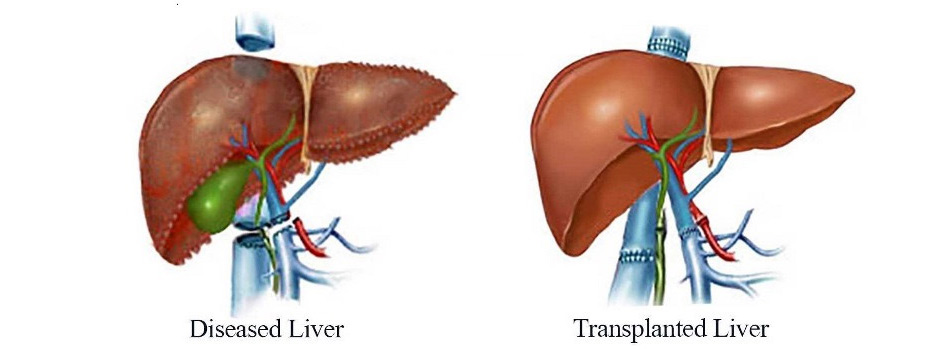
Among the most common reasons for a liver transplant are:
End-stage cirrhosis from any cause, including chronic hepatitis B or C, alcoholic cirrhosis, and non-alcoholic fatty liver disease. While cirrhosis itself isn't a signal for a transplant, signs of decompensation (such as encephalopathy, bleeding varices, or recurrent ascites) can often serve as reasons.
Certain liver cancers, including cholangiocarcinoma, hepatocellular carcinoma (HCC), primary hepatocellular malignancies, and hepatic adenomas
Fulminant hepatic failure due to fulminant viral hepatitis (A, B, D, and rarely C), medication-associated liver failure, hepatic thrombosis, Wilson's disease, or other causes
Severe dysfunction of the bile ducts resulting in biliary cirrhosis and sclerosing cholangitis


Inconsistencies for liver transplantation are those that can either increase the possibility of death for the beneficiary or will likely result in the failure or rejection of a transplant.
Among some of the outright contraindications for transplantation are:
> Current alcohol or substance addiction
> Severe heart or lung disease
> Cancers (excluding some liver cancers and non-melanoma skin cancer)
> Severe and multiple birth defects that will likely lead to premature death
> Certain unrestrained infections or life-threatening diseases
There are also a number of relative contraindications, so-called because they may or may not preclude someone from a liver transplant:
> Advanced age (older than 65 years)
> Kidney failure
> Severe malnutrition
> HIV (although less of an issue for patients with sustained viral control)
> Severe pulmonary hypertension
> Severe, uncontrolled (or untreated) psychiatric disorders
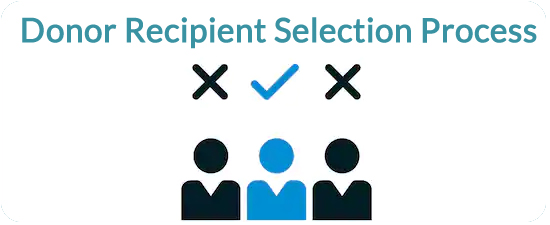
Once a diagnosis of liver disease is made, a gastroenterologist a specialist in the digestive system can make a recommendation to a transplant centre.
After you've designated a transplant center, you'll need an assessment to determine whether you meet the center's eligibility requirements. Each transplant center has its own admissibility criteria. If you aren't accepted at one transplant center, you may undergo evaluation at an alternative center.
There, your medical records will be revised and a variety of tests will be done to determine if you are ill enough to need a new liver, but well enough to tolerate the transplant procedure.
These include:
> A thorough exam and assessment by a hepatologist (liver specialist)
> Blood tests
> X-rays and other imaging tests, such as CT or MRI scans
> An electrocardiogram (EKG)
> An endoscopy to examine your digestive tract
> A colonoscopy to examine your large intestine
> A psychiatric evaluation to determine your capability to manage the demands of the transplant procedure and care for yourself post-transplant.
Once these tests and consultations are finished, the transplant center's selection committee meets to confer about your situation. The committee decides whether a liver transplant is the best treatment for you and whether you're healthy enough to undergo a transplant.
If the answer to both questions is yes, then you're placed on the liver transplant waiting list.
Before the Procedure
The Waiting list
Doctors will use the outcomes of your liver function tests and other factors to evaluate the severity of your illness, how urgently you need a transplant and your place on the liver transplant waiting list. Unfortunately, more people need liver transplants than there are livers available.
Your transplant waiting list primacy is determined by two scoring systems called Model for End-Stage Liver Disease (MELD) for adults and Paediatric End-Stage Liver Disease (PELD) for children younger than age 12.
Your doctor will use a particular formula to determine your MELD scores, which can range from 6 to 40. The scores evaluate the risk of death within 90 days without a transplant. A high MELD score indicates the urgent need of a transplant.
As deceased-donor organs become accessible, they are allocated according to MELD scores and classified by blood type. People with higher MELD scores are generally offered donated livers first. Time spent on the liver transplant waiting list is used to break ties among people with the same MELD scores and blood type. Some liver conditions, such as liver cancer, may not result in a person getting a high MELD score. The transplant center can request extra MELD points for people with specific diseases if they meet defined concession criteria.
Other methods of recipient evaluation can be used as well, including the Milan Criteria, which qualifies a person based mainly on the size and/or number of liver lesions (i.e., no bigger than 5 centimetres, or no more than three lesions equal to or less than 3 centimetres in size).
In addition, adults with acute liver failure are exempted from the MELD-based donor organ prioritization system and may be placed higher on the transplant waiting list in accordance to the severity of their disease.
Waiting for a new Liver
The wait for a donor liver can vary greatly. Some people wait days, while others wait months or may never receive a deceased-donor liver. As you wait for a new liver, your doctor will treat the difficulties of your liver failure to make you as relaxed as possible.
Complications of end-stage liver failure are serious, and you may be recurrently hospitalized. If your liver worsens, your MELD score is updated.
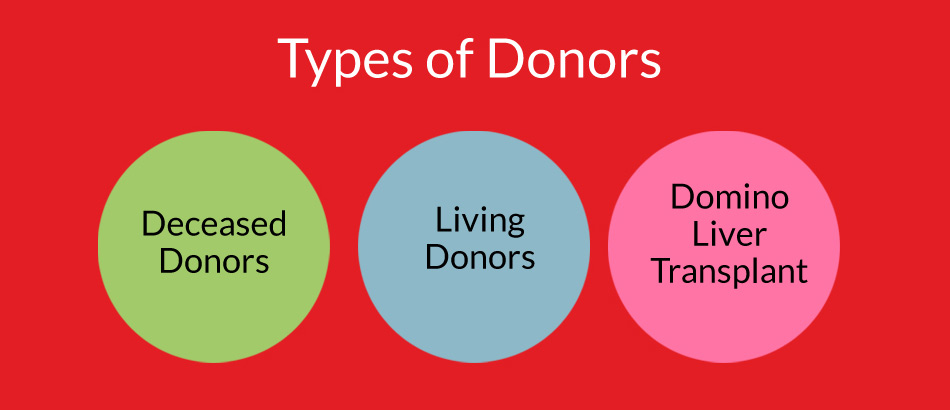
Donor livers can come from a deceased person—who donates their organ either because of a pre-established wish or their family's decision—or from a living donor.
Deceased Donors
When you are placed on the waiting list that is to receive a deceased donor's liver only. Livers from deceased donors are usually harvested from people under age 70 who were comparatively healthy before dying as a result of an accident or other sudden event./
Living Donors
Living donors are almost always people you know and/or are related to. A segment of the liver is removed. Due to the liver’s ability to regenerate, the liver can return to its full weight within a few weeks of donation. Within a few months, it is back to normal size in a healthy donor.
It isn't essential to match the donor and recipient for age, sex, or race, but blood types between donor and recipient must be well-matched. Body size is also taken into account.
Donors are screened for hepatitis and HIV. While rare, it is likely to contract an infectious disease through a transplanted organ. In some cases, a liver from a donor with an infectious disease, such as hepatitis C (HCV) may be transplanted into a recipient who does not have the same disease. This is often a calculated risk if the recipient is very ill and in danger of dying before a liver becomes obtainable.
In this case, if a liver from a hepatitis-positive donor becomes available, that organ may be accepted based on the consideration that the recipient is willing to risk contracting HCV rather than die waiting for a completely healthy organ. Because of major advances in drugs used to treat HCV, more HCV-positive livers are being accepted for transplant than ever before.
You Can Be a Donor If- - You are between the ages of 18 and 60
- - You have a body mass index (BMI) under 35
- - Your blood type is compatible with that of the recipient
- - You are in good health both physically and mentally
You Cannot Be a Donor If
- - You have kidney disease or heart disease
- - You are currently being treated for cancer
- - You have HIV or AIDS
- - You are actively abusing substances
Domino Liver Transplant
Another, less common type of living-donor transplant is called a domino liver transplant. This type of transplant is done when a recipient is unlikely to be high enough on the waitlist to receive a healthy liver in time to help them—for example, someone with advanced liver cancer might be a candidate.
With the domino transplant, the recipient gets a liver from a living donor who has an inherited disease called amyloidosis—a rare disorder in which irregular protein deposits accumulate and eventually harm the body's internal organs.
Because the donor will be far along in the disease procedure for amyloidosis, they qualify for a healthy liver. Their liver, however, is adequate for the recipient because it usually takes decades for amyloidosis to cause symptoms in someone who did not inherit the disease.
If you are the recipient of a domino transplant, you will be scrutinized for signs of the condition.
Before Surgery
Staying healthy
Whether you're waiting for a donated liver or your transplant surgery is already scheduled, work to stay healthy. Being healthy and as active as you're able can make it more likely you'll be ready for the transplant surgery when the time comes. It may also help speed your recovery from surgery. Work to:

Stay in touch with your transplant team, and let them know of any significant changes in your health. If you're waiting for a donated liver, make sure the transplant team knows how to reach you at all times. Keep your packed hospital bag handy, and make preparations for transportation to the transplant center in advance.
Surgical Process
Once a donor liver becomes accessible, it must be transplanted into a recipient within 12 to 18 hours. You should keep a packed hospital bag handy and make arrangements for transportation to the transplant centre in advance. Make sure the transplant team knows how to reach you at all times.
Before your surgery takes place, you will undergo standard pre-operative testing that includes blood tests, an EKG, a chest X-ray, and a urinalysis. Your vital signs—heart rate, blood pressure, and oxygen saturation—will also be assessed.
You will be asked to sign a consent form to show that you approve and accept the risks of the surgery.

Deceased-Donor Liver Transplant
If you're informed that a liver from a deceased donor is available, you'll be asked to come to the hospital immediately. Your health care team will admit you to the hospital, and you'll undergo an exam to make sure you're healthy enough for the surgery.
Liver transplant surgery is done using common anaesthesia, so you'll be sedated during the process.
The transplant surgeon makes a long incision across your abdomen to access your liver. The location and size of your incision varies according to your surgeon's approach and your own anatomy.
The surgeon removes the diseased liver and places the donor liver in your body. Then the surgeon connects your blood vessels and bile ducts to the donor liver. Surgery can take up to 12 hours, depending on your situation.
Once your new liver is in place, the surgeon uses stitches and staples to close the surgical incision. You're then taken to the intensive care unit to begin recovery.
Living-Donor Liver Transplant
If you're receiving a liver transplant from a living donor, your surgery will be scheduled in advance.
Surgeons first operate on the donor, removing the portion of the liver for transplant. Then surgeons remove your diseased liver and place the donated liver portion in your body. They then connect your blood vessels and bile ducts to the new liver.
The transplanted liver portion in your body and the portion left behind in the donor's body regenerate quickly, reaching normal volume within a several weeks.
With an Orthotopic Transplant
Your own liver is surgically removed from the body, taking care to preserve blood vessels where possible, so that the new liver can be sewn into place. Once the new liver is reconnected to the blood supply and the bile duct (a small tube that carries bile made in the liver to the intestines), your incision will be closed and you will be taken to the recovery area.
With a Heterotopic Transplant
Your own liver will remain in place and the new liver will be attached to another site in your abdomen, such as the spleenBoth procedures take around 10 hours to complete.
Complications
In addition to the general risks of surgery and general anaesthesia, transplant patients face risks associated with the procedure itself, as well as with the immunosuppressant drugs necessary to prevent rejection of the donor liver after the transplant. Surgical risks include:s - Bile duct complications, including bile duct leaks or shrinking - Infection - Bleeding - Blood clots - Failure of donated liver - Rejection of donated liver - Mental confusion or seizures
Long-term complications may also include reappearance of liver disease in the transplanted liver, as well as contracting HCV in cases where the liver donor was positive for that disease.
Anti-rejection medication side effects
After a liver transplant, you'll take medicines for the rest of your life to help inhibit your body from rejecting the donated liver. These anti-rejection medications can cause a variety of side effects, including:
● Bone thinning ● Diabetes ● Diarrhoea ● Headaches ● High blood pressure ● High cholesterol
Because anti-rejection drugs work by suppressing the immune system, they also amplify your risk of infection. Your consultant may give you medications to help you fight infections.
After Surgery
After your liver transplant, you can expect to:
Possibly stay in the intensive care unit for a few days. Doctors and nurses will monitor your condition to watch for signs of complications. They'll also test your liver function frequently for signs that your new liver is working.
Spend 5 to 10 days in the hospital. Once you're stable, you're taken to a transplant recovery area to continue recuperating.
Have frequent check-ups as you continue recovering at home. Your transplant team designs a check-up schedule for you. You may undergo blood tests a few times each week at first and then less often over time.
Take medications for the rest of your life. You'll take a number of medications after your liver transplant, many for the rest of your life. Drugs called immunosuppressant help keep your immune system from attacking your new liver. Other drugs help reduce the risk of other complications after your transplant.
Prognosis
Your probabilities of a successful liver transplant and long-term survival hang on your particular situation.
In general, about 75% of people who go through liver transplant live for at least five years. That means that for every 100 people who receive a liver transplant for any cause, about 70 will live for five years and 30 will die within five years.
People who receive a liver from a living donor often have better short-term survival chances than those who receive a deceased-donor liver. But equating long-term results is difficult because people who have a living donor usually have a shorter wait for a transplant and aren't as sick as those who receive a deceased-donor liver.
Coping and Support
It's normal to feel nervous or dazed while waiting for a transplant or to have uncertainties about rejection, returning to work or other issues after a transplant. Seeking the support of friends and family members can help you cope during this stressful time.
Your transplant team can also help you with other useful resources and coping strategies throughout the transplant process, such as:
Joining a support group for transplant recipients. Talking with others who have mutual experience can ease fears and worry.
Sharing your experiences on social media. Connecting with others who have had a related experience may help you adjust to your changing situation.
Finding rehabilitation services. If you're returning to work, your social worker may be able to connect you with rehabilitation services provided by your home state's department of vocational rehabilitation.
Setting genuine goals and expectations. Recognize that life after transplant may not be exactly the same as life before transplant. Having realistic expectations about results and recovery time can help reduce stress.
Educating yourself. Learn as much as you can about your procedure and ask questions about things you don't understand. Knowledge is empowering.
Diet and Nutrition
Your body calls for more calories and protein while you are healing from a liver transplant, as the surgery takes a toll on energy and muscle strength. Your transplant team will possibly consist of a nutritionist, who can help you come up with a healthy eating plan.
In general, protein should come from lean meats, fish, eggs, beans, and nuts. Fruits, vegetables, and whole grains are essential as well. Because immunosuppressant medications can cause weight gain, you should limit high-fat foods.
You may also be asked to limit or cut out alcohol entirely, as alcohol is a major cause of liver damage and may have added to your need for a transplant.
Exercise
Exercise and physical activity should be a consistent part of your life after a liver transplant to continue improving your general physical and mental health.
Soon after your transplant, you should walk as much as you can. Then, dependent on your improvement, you can start integrating more physical activity into your daily life.
Walking, bicycling, swimming, low-impact strength training and other physical activities you enjoy can all be a part of a healthy, active lifestyle after transplant. But be sure to check in with your transplant team before beginning or altering your post-transplant exercise regime.
* Conditions Apply

